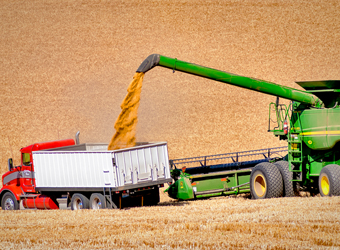An Egyptian court has decided to re-instate a zero tolerance policy on common grain fungus ergot, lawyers on the case told Reuters Tuesday, plunging trade with the world’s largest wheat importer back into uncertainty.
Egypt last year scrapped a ban on ergot in grain imports after it effectively halted purchase tenders because trading houses refused to participate, saying the ban was an impossible requirement.
In its place, Egypt imposed a more internationally standard 0.05 percent tolerance threshold for ergot and restructured its food inspection system, transferring responsibility for strategic agricultural imports from the agriculture ministry’s quarantine body, which favoured the ban, to the trade ministry.
A ruling scheduled for next week will scrap that new system, effectively reinstating the ergot ban, according to lawyers who were informed of the court’s decision verbally on Tuesday.
The verdict is expected to be formally announced on June 13 and is subject to appeal but must be implemented during the appeal process, said Khaled Ali, one of the lawyers on the case.
An agriculture ministry spokesman told Reuters the inspection system for grain imports remained unchanged, as did the permitted level of ergot in wheat shipments – currently 0.05 percent.
The trade ministry declined to comment.
RETURN TO UNCERTAINTY
The case was brought by a group of quarantine inspection employees in their capacity as citizens, not by the body itself, as well as several other parties, including some connected to the health ministry, which also takes part in inspections.
The inspectors involved said the new system illegally stripped the quarantine body of its authority and handed it to a trade ministry body ill-equipped to oversee inspections, allowing imports to enter with hazardous contaminants harmful to plant and human health.
“All that mattered to us in this, is that this decision, when it was issued, allowed for the entry of things at levels that would harm people – like ergot, ambrosia, and white mould,” said Mohamed Zaki, a quarantine inspector who raised one of the cases.
Grains traders have said a zero tolerance ergot policy makes doing business with Egypt too risky given the costly possibility that their cargoes may be rejected upon arrival.
“My worry is this decision could lead to a return to uncertainty and even a disruption of Egypt’s wheat imports just as the situation has been returning to normal,” one German trader said, echoing the sentiment of several others.
Egypt last month purchased about 500,000 tonnes of wheat in tenders held by its state-grain buyer GASC. Turnout among traders has returned to normal following several boycotts last year in response to the zero policy.
The current system was imposed by a decree in November that named the General Organization for Export and Import Control (GOEIC), which is part of the trade ministry, as the body responsible for inspecting the imports.
Source: Reuters
